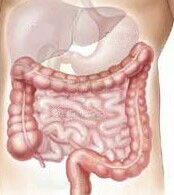More polyps, other markers of colon tumor risk in those eating ‘Western’ high-fat, low-fiber fare
WEDNESDAY, April 29, 2015 (HealthDay News) — Westernization of the diet induces changes in biomarkers of colon cancer risk within two weeks, according to research published online April 28 in Nature Communications.
The new study involved a group of 20 black American volunteers and 20 more participants from rural South Africa. Under close supervision, the participants swapped diets for two weeks. Before the switch, however, all of the participants underwent colonoscopies. A second procedure was performed at the end of the study period. The researchers also assessed certain risk factors for colon cancer, including biological markers for the disease. And they examined bacteria samples taken from the participants’ colons.
When the study began, nearly 50 percent of those in the American group had polyps, or abnormal growths, in the lining of their colon. Although these growths are not harmful, they could eventually lead to cancer, the researchers noted. In contrast, none of the volunteers from South Africa had polyps upon entry to the study. After two weeks of eating the African diet, the American volunteers showed dramatic reductions in colon inflammation. They also showed declines in certain other signals tied to colon cancer risk. On the other hand, colon cancer risk factors rose significantly among the Africans who made the switch to a high-fat, high-protein, low-fiber American-style diet, the team said.
“We can’t definitively tell from these measurements that the change in their diet would have led to more cancer in the African group or less in the American group, but there is good evidence from other studies that the changes we observed are signs of cancer risk,” study coauthor Jeremy Nicholson, Ph.D., of Imperial College London, said in a college news release. The good news, he said, is that “people can substantially lower their risk of colon cancer by eating more fiber. This is not new in itself but what is really surprising is how quickly and dramatically the risk markers can switch in both groups following diet change.”
Copyright © 2015 HealthDay. All rights reserved.








